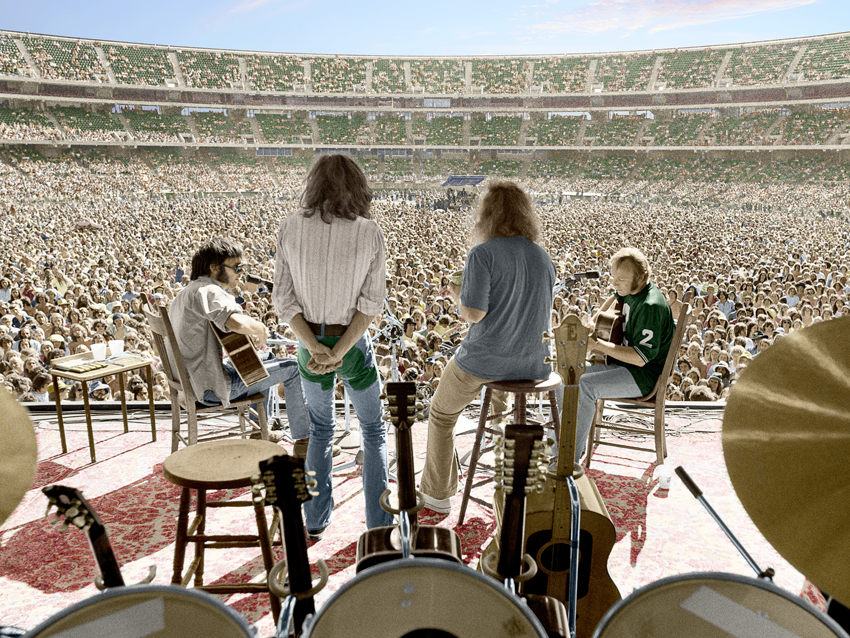
Graham Nash talks about the CSNY 1974 live box set
Graham Nash chuckles and calls them “small audiences” – the crowds of up to 80,000 that Crosby, Stills, Nash and Young faced during their 31-date concert tour of stadiums, coliseums and speedways in the summer of 1974. “Sure, it sounds like a lot, and it is a lot,” he says, “but we had already played Guinevere with one guitar and our voices to half a million people at Woodstock. We were like, ‘What’s 80,000 people? We can do this.’”
Inter-band tensions and flourishing solo careers had kept the four-piece inactive since 1970, but the promise of a big payday for what turned out to be the first extensive stadium run by any rock act proved too tempting to turn down. “There was a lot of money on the table, that’s true,” Nash notes. “But beyond that, we knew that we were good, once we concentrated. We were full of ourselves. We knew we could hit the front row and the back row.”
Mirroring the already legendary exploits of Led Zeppelin and The Rolling Stones, CSNY’s ’74 tour was one of unbridled excess, with copious amounts of cocaine and pot fueling the band day and night. “It was insane,” Nash remembers. “We were completely high every moment. Cocaine, marijuana – oh, and sleeping pills, too, because you have to come down. You helicopter into Mile High Stadium, you do the show, and then you do the after-show party – it’s hard to sleep. But that’s how we were then. It was no problem to do four-hour shows. The music was strong enough to keep us going.”
And that music, detailing the works to that time of CSN, CSNY and the band members’ solo catalogues, is now stunningly preserved in a lavish three-CD/one-DVD collection, CSNY 1974 (due out July 8). Painstakingly compiled over a four-and-a-half-year period by Nash and co-producer Joel Bernstein (who was the official tour photographer in ’74), the 40-song package documents the group’s then-novel electric/acoustic/electric set format, vividly capturing the foursome’s widescreen harmonies on a cavalcade of classics and deep cuts, along with feral, snaggle-toothed guitar duels between Stills and Young.
Graham Nash sat down with MusicRadar in New York the other day to talk about the process of putting together CSNY 1974 and to recount the band’s time on the road 40 years ago. (You can pre-order CSNY 1974 at the band's official website or on Amazon. And be sure to check out Wooden Ships from the live set below.)
Was this project something that was thought about or attempted back in the ‘70s?
“Well, we knew we were recording the shows. We did multi-track recordings at nine of the shows and two-tracks at all of them. You can’t do much with a two-track, of course; it’s basically done and it’s there. After the last show at Wembley Stadium, we came back to America and had a meeting, and we listened to that gig. Honestly, it wasn’t a great show, not by our standards, so we kind of soured on the idea of putting out any kind of record.
“My own feelings were different: I always knew there was a jewel in there to be made; I knew we played brilliantly on some nights. Wembley Stadium was just not one of those nights. A couple of tracks from Wembley were great, and they’re on the box set. Somebody showed us a DVD of the Wembley performance, and to our way of thinking, it wasn’t great as a whole show. I didn’t want the fans to think that that’s how we were. I wanted to show them who we were and how we were – it took a bit of time.”
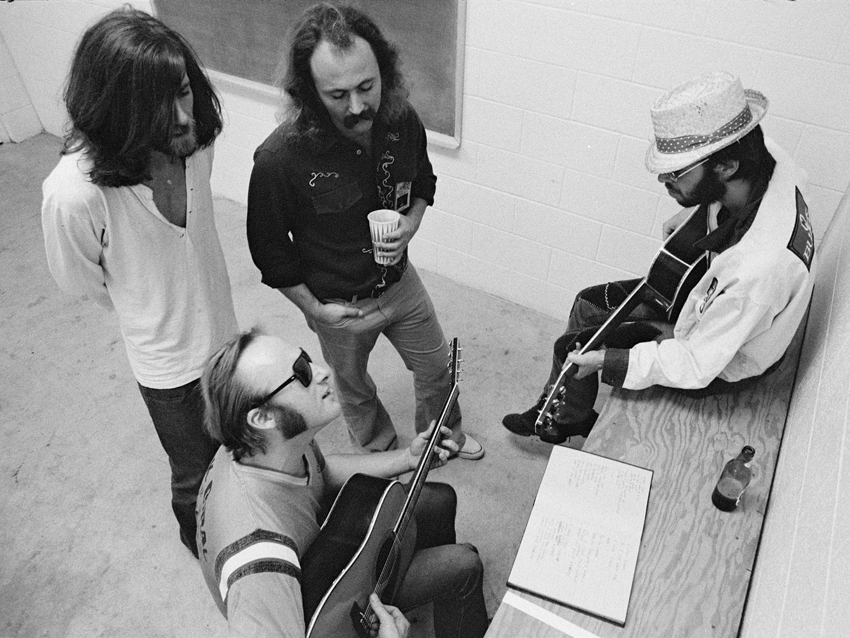
The tapes
Were you getting comments from the other guys as you and Joel put the set together? With so many songs and three other people to please, the potential for problems could grow exponentially.
“The possibilities were endless. I kept the boys apprised of what I was doing. David and Stephen trust me. They know that I’m a democratic person, and I want everyone to shine on everything – it’s understood. And then there’s Neil…
“Neil wasn’t enthusiastic about revisiting the past. He never is, and I understand that. Having said that, with Joel Bernstein, I made a rough demo of the idea. None of it was mixed or fixed or anything like that, but there was an energy to it. I drove up to Neil’s ranch and sat him down and said, ‘This is what I wanna do.’ Once he heard what I had in mind, he said, ‘Right. Absolutely, go ahead. I can’t help you with it ‘cause I’m busy.’ I was a busy boy myself, but I wanted history to recognize that Crosby, Stills, Nash and Young were a really decent rock ‘n’ roll band.”
What condition were the tapes in? Did you have to bake any of them?
“I’ve been the one who’s in charge of archiving all of our tapes. For the last 30 years or so, they’ve been in a storage facility. It’s a Swiss system – very low temperature, halon gas protected. Everything was in really good shape – pristine. I didn’t have to bake anything, which was amazing. So that pleased me to no end.
“There are no overdubs on the record, none anywhere on the 40 songs. If something was out of tune, I would either tune or I’d find it from another show – I’d find something at roughly the same tempo and I’d put it on. I did a lot of sweetening, not necessarily in terms of tuning but in balancing the band. I mean, God bless [drummer] Russell Kunkel and [bassist] Tim Drummond – what an incredible rhythm section. And God bless Stephen, Neil and David for being able to sing and play like they did. We went from one song with an acoustic guitar to blazing rock ‘n’ roll.”
So how did it fall on your shoulders to be the band’s tape archivist?
“I just think I’m the only one with the patience for it.”
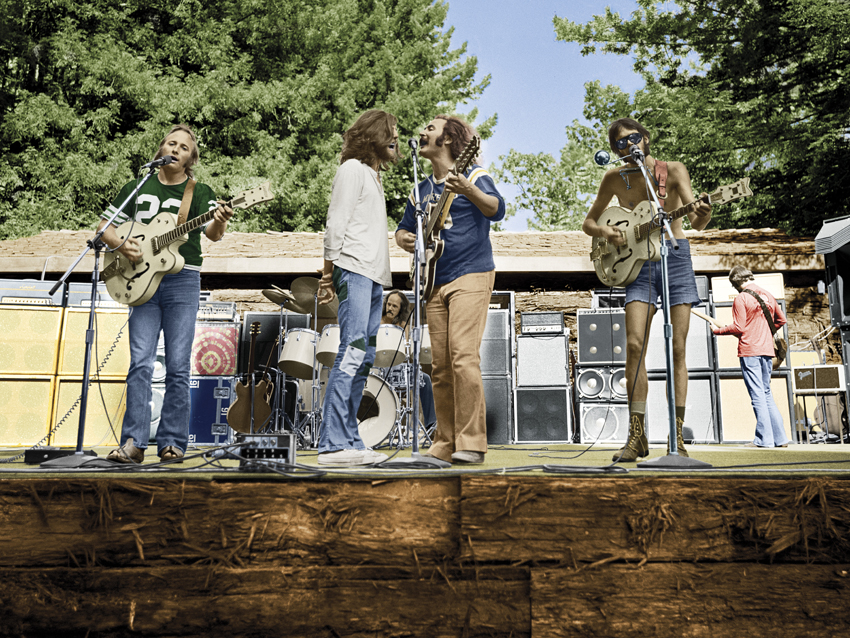
Playing stadiums
How did the band decide on doing the electric/acoustic/electric format for the tour? It’s pretty standard stuff these days, but had anybody done it prior to you guys?
“No, they didn’t. Nobody did that before us. Here’s what happened with that: We tried earlier to start the show on acoustics, but it didn’t work. The people in the audience were restless, they were coming in, taking their sets, getting their popcorn or whatever – the energy just wasn’t right for that. You have to get the audience in the right frame of mind for that, and you can’t do at the start of the show. So we just said, ‘Why don’t we rock out for the first few songs, let people get into it, and then we’ll break out the acoustics later on?’ At first, it was simply functional, but then it worked out to be interesting show business-wise as well.”
I’m assuming that the running order on the box set mirrors the basic setlist of the tour. How did the band arrive at setlists back then? Was it a bit of a grab bag?
“It’s always been a grab bag. For this project, with Joel Bernstein and Stanley Johnston – he was the engineer, and he did a brilliant job – we made a digital map of every single song, in what order, from all of the shows, 31 of ‘em. We noticed a pattern to the sets, so we made a line through the digital map of the journey, and it worked out to be pretty good.”
At outdoor shows even today, the sound can be iffy. What was it like for the stadium gigs in ‘74? Was the monitor system good?
“The monitor situation left a lot to be desired, in retrospect, but at the time we had what we thought were the best speakers and the best guys around to do the front-of-house sound. We did play awfully loud, but you know, that’s fine. Personally, I had a great time on that tour. I don’t give a shit what David and Stephen and Neil think of it – I had fabulous time.
“We reached not only the front row but the back row, too. And sometimes the back row was a mile and a half away. [Laughs] You got to be able to hear yourselves to do some of the intricate harmonies that we do. It wasn’t always perfect, but we managed to do it.”
Neil’s song Goodbye Dick is a nice little surprise. How did that happen?
“It’s a great song, isn’t it? It was the last song that I found, after I had done the programming of everything else. There was no way I was going to leave it off. It’s very much in the spirit of the whole thing. On that tour, we were really in tune with what was affecting people. In ’74, the Vietnam War was ending, Watergate was happening – this is why I put Goodbye Dick on. What a cool song. It’s only a minute and a half, but it’s fantastic. It was only done once during all 31 shows.”
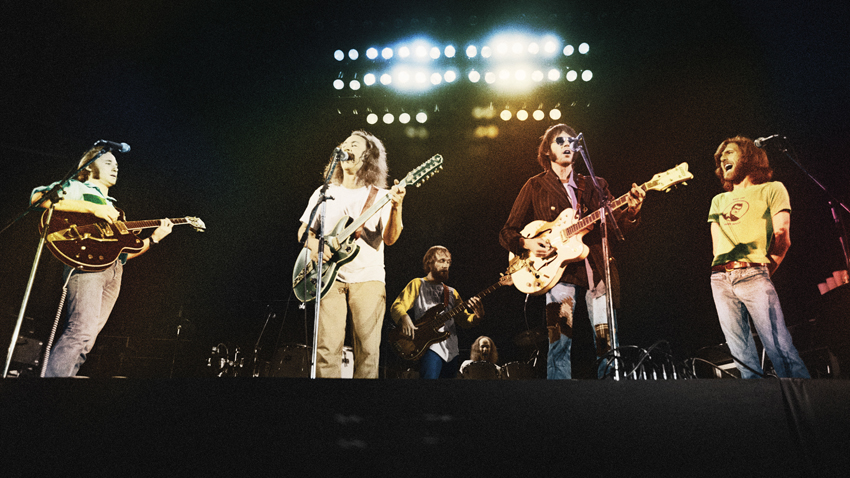
On Neil Young
Did Neil just spring it on you?
“David and Stephen and I had never heard the song. We did that kind of thing occasionally. I wrote a song about the girlfriend I was with at the time – I’d written it in the morning and we performed it at night. On the tape, Stephen is yelling, ‘Hey, Willie, what are the chords?’ And I’m telling him the chords to a song we did in front of thousands of people. We were ballsy. We were full of piss and vinegar.
“So with Goodbye Dick, we had never heard the song, but Neil wanted to play it. Who the fuck is going to tell Neil Young not to do a song? And it was brilliant, because it was about Richard Nixon and Rosemary Woods. It was the song in the set that really pinned societally what was going on. Watergate, the anti-Vietnam War, the 18-minute tape gap – all of those things were so important to us in ’74. I used to have three televisions tuned to CBS, NBC and ABC to watch what was going on. We were all paying attention to what was happening.”
How come you don’t include a version of Carry On?
“I just couldn’t find one that thrilled me. I spent 80 hours listening to every conceivable performance of that song – ‘Can we take the front half of this? Can we take the back off of this?’ Nothing came close. I was most apprehensive with I called Stephen to tell him that one of our most famous songs, written by him, wasn’t on there. But he just said, ‘Willie, if you don’t think it’s there, it’s not there.’ That was such a relief – it’s such an important song in our repertoire.”
Neil traveled separately from the rest of the band – why?
“He never said why, but I understand why. Neil is not a person of excess. He is only ever interested in the music, and God bless him for that. The drawing that Joni Mitchell had done that had become the iconic image for the tour, it was embroidered on our hotel pillows. It was stamped into teak plates with a big brand. It was a tour of excess, no doubt about it. Neil wasn’t into that.”
What were your hopes for the band during the tour? Did you think there was an immediate future for CSNY?
“I’ve never expected anything of this band. I learned a long time ago, with the first show we played, that you can’t expect anything. We started a tour, and after the first night we hated each other and left. There are no rules with this band. I never thought about tomorrow with us. We were so busy doing what we were doing. I couldn’t think about what we might do next year – we’ve got a show to do in Denver tonight!” [Laughs]
I’d like to get your thoughts on some of the recordings you have on the set.
“Absolutely. Go right ahead.”
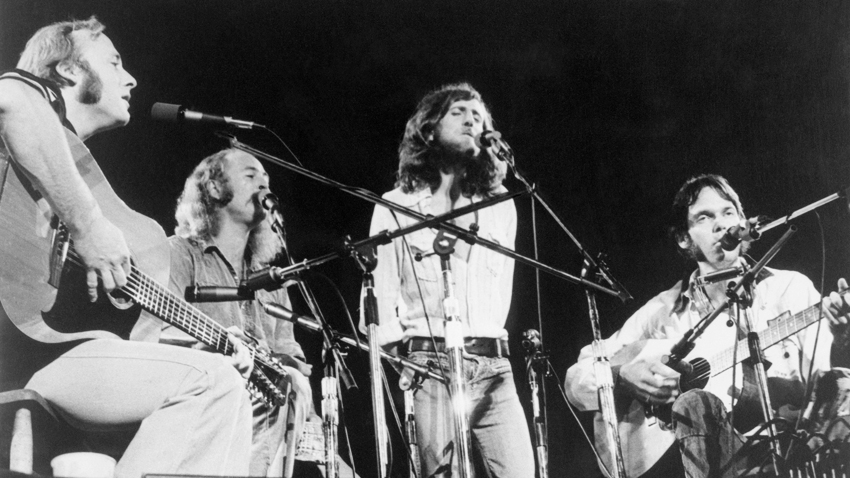
Our House
Love The One You’re With.
“Once we made the digital map, we realized that we started every show with that song. There must’ve been a reason, and the reason was it’s a kick-ass rock ‘n’ roll song. It made us feel comfortable, we knew what the harmonies were, and it made us feel good.”
Of your own song Pre-Road Downs, David said that it was something you wrote “when you realized you could write rock n’ roll.” Fair assessment?
[Laughs] “That’s interesting. My work with the Hollies, I don’t know if that’s rock ‘n’ roll. It was a pop group – and a very good one. Pre-Road Downs was the first song I wrote that had that kind of energy. I was with Joni at the time, but I realized that I’d have to go out on the road; and Joni, with her incredible talent, she would have to go out on the road as well. We had to spend a lot of time apart, and we knew that, so this was the pre-road depression. I had to be away from this woman I loved for months.”
Almost Cut My Hair.
“Crosby forgot to count it off. [Laughs] He just walked up to the mic, hit the guitar – ‘Almost cut my hair.’ He was into it. But I have to tell you, Stephen and Neil play great on that. They play great on everything.”
As guitarists, they kind of spar. You have two guys with not just different styles but very distinct personalities as musicians. They go at each other.
“It’s two guys that really know each other and really love each other, but they want to one-up each other with every single note. It shows – you can hear it.”
Wooden Ships demonstrates that as well.
“Oh, yeah. I love that version. The energy that Neil brings to the music… it’s more intense, and it’s darker somehow, not in a negative way but in a positive way. He didn’t play on the original because it was a CSN song, so to have his take on the song brought more energy to it. I think this version is absolutely incredible. I love what Neil does to us, and I love what we do to Neil.”
Your song Our House sounds both intimate and anthemic. What was it like performing it before such huge audiences?
“It was interesting, that one. On the DVD is a version of me doing it at Wembley Stadium. Because I’m English, I was coming home – they knew who I was because of the Hollies. The response to that song was phenomenal, and it’s basically me on piano and the others coming in on the harmonies. Yeah, the response from all of those people… it’s extraordinary.”
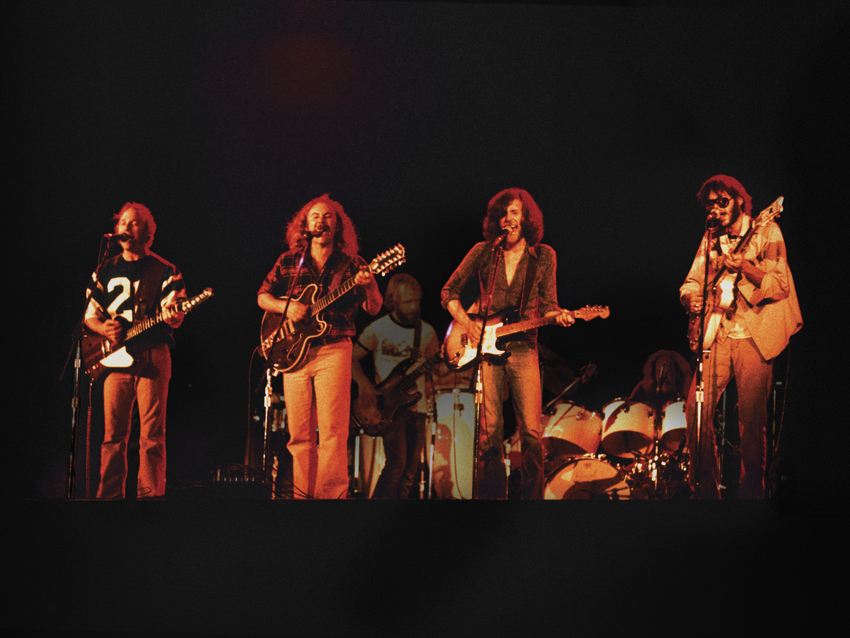
Other retrospective projects
Blackbird by The Beatles – CSN started performing that at Woodstock.
“We rehearsed it in London in late ‘68. It was very interesting to find out that it was actually a civil rights song, because ‘bird’ is how you relate to ladies occasionally – like ‘chicks’ here. Both words are horrible, really. But Paul McCartney had seen three African-American ladies singing We Shall Overcome, I think, and he wrote Blackbird. Not only that, but what an incredible melody – and what a vehicle for three voices.”
Was that one of the Beatles songs CSN wanted to do on the aborted covers album with Rick Rubin?
“Yep, that’s one of the ones we did with Rick. But he wanted to do it differently. ‘Don’t use the guitar – just sing it.’ That’s what he said. It was interesting, an a cappella version. The unfortunate thing with Rick was his relationship with Crosby. Because we’re so full of piss and vinegar, you can’t tell us what to do. You can suggest any fucking thing you want, but don’t tell us what to do.”
You wanted to do two Beatles songs on the album.
“Blackbird and Norwegian Wood. But Rick said, ‘No, no, there’ll only be one Beatles song.’ And, of course, David said, ‘There’ll only be one if we say there’s only one.’ That’s when Rick said, ‘I’m the producer. There’ll only be one.’ From that moment, it was over.”
Are there any other CSN or CSNY retrospective projects you’re working on?
“There is. I’m working on our 1970 shows at the Fillmore East, which were filmed. Not only was the stage show filmed, but a lot of the stuff off stage was, too. It’s an incredible project, but you know, it took me years to do this. Not because I was in the studio constantly – I’ve been busy touring, doing photo shows, painting and all of those other things. My book took a lot of time, too.
“It’s a big undertaking, the collections. I’ll tell you a story about this set: You know the photo on the cover? That was originally black and white.”
You colorized it? Wow, you sure fooled me!
“Hand colored. But here’s the thing: When I talked to Neil about it and told him about the shot I wanted to use, he said, ‘I don’t think so. We’re aggrandizing ourselves. We’re making ourselves look too important.’ And I said, ‘Neil, we didn’t do that 31 times in a row? We didn’t do that in front of many thousands of people each night?’ So he thought about it and went, ‘Yeahhhh, you’ve got a point.’” [Laughs]
Joe is a freelance journalist who has, over the past few decades, interviewed hundreds of guitarists for Guitar World, Guitar Player, MusicRadar and Classic Rock. He is also a former editor of Guitar World, contributing writer for Guitar Aficionado and VP of A&R for Island Records. He’s an enthusiastic guitarist, but he’s nowhere near the likes of the people he interviews. Surprisingly, his skills are more suited to the drums. If you need a drummer for your Beatles tribute band, look him up.
